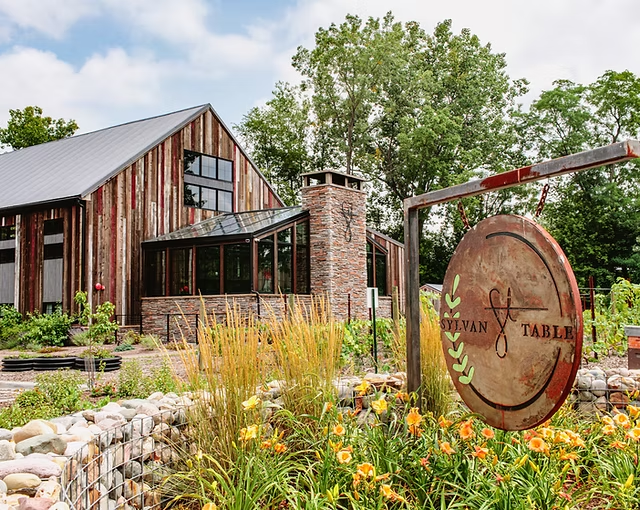by Tatum Saltsman

This piece is part of the Detroit Journalism Summer Camp, run by The Detroit Writing Room in partnership with Planet Detroit.
Sustainability and environmental awareness are two concerns that many people often overlook when planning their next dining experience. But that’s what many thriving Metro Detroit establishments are serving up.
With concerns over the environment and climate change rising, many consumers are making efforts to change their lifestyles. In response, restaurants are catering to this growing market by offering farm-to-table fare made with fresh, non-processed and organic ingredients.
The concept of sustainability in restaurants has been around for years, but has proven enduring in the marketplace. These restaurants typically offer clean, zero-chemical and organic products.
Take Selden Standard, a sustainable restaurant in Detroit that opened in 2014. The restaurant has found a winning formula by offering dishes that cater to customers’ desire for locally sourced ingredients. It got off to a fast start by winning The Detroit Free Press’s “Restaurant of the Year Award” in 2015 and has since become one of the area’s more established farm-to-table restaurants.
“Fortunately, every part of an ingredient contains flavor, so there’s a lot of incentive both in terms of cost and quality to use as much of a given product as possible,” says co-owner Evan Hansen. “For example, we can make our high-quality chicken stock from bones or veggie stock from scraps; we can infuse the tiniest bit of leftover fruit into a bar ingredient; small off-cuts can be incorporated into our daily staff meal; and so on.”
Selden Standard has been a leading voice for sustainable dining in the Detroit area, promoting greater awareness of climate change in the day-to-day operations of businesses.
Then there is Sylvan Table, a farm-to-table restaurant in Sylvan Lake, 30 minutes outside of Detroit, that opened in 2021.
Sustainability has been Sylvan Table’s top priority, and its owners continually strive to do more.
“We hope our impact reaches past Sylvan Lake,” general manager Sadie Simon says. “Our farm manager, Rick, hosts farm classes one Saturday a month. He talks about our practices out on the farm. He has also done this with other groups like Girl Scouts, students and senior citizens. Our staff is well informed about everything we do, and they work it into their welcome speech to first-time guests.”
As Sylvan Table has gained more customers, it has only increased its focus on sustainability. For example, it ensures proper composting and finding effective solutions for its food waste.
Sylvan Table is part of a new effort on composting through Make Food Not Waste, which aims to cut Michigan food waste in half by 2030. The restaurant recently earned a gold-level certification for reducing food waste.
Another business that focuses on local products is Marrow, a butcher shop and restaurant with multiple locations. With a flagship restaurant in the West Village and a shop in downtown Birmingham, Marrow has been in business for nearly seven years.
Marrow’s Executive Chef Eddie Moreau seeks to combine quality with an awareness of the restaurant’s environmental impact.
“Sustainability and environmental friendliness are pretty much everything,” he says. ”It’s just connecting with local people, putting money back into the community.”
He adds: “We have a wide array of farmers that we deal with: beef, pork … ducks, rabbits, so everything’s local. It’s coming from the Thumb,” — a reference to the peninsula in eastern Michigan — “and then there are some things that we get from the Upper Peninsula and the West Coast of the state, but it’s really like hyper local in the Thumb. Sustainability for us is pretty much the whole model.”
Because of this emphasis on local sourcing of ingredients, Marrow’s menu can change frequently.
“One week asparagus is popping and it’s gone,” Moreau says. “Then the next week, there’s broccoli or eggplant or tomatoes. We can shift constantly and just work with whatever is in peak season at that given time.”
As Marrow and other farm-to-table restaurants focus on sustainability, they continue to leave their mark and benefit Detroit in the best ways to improve the environment.
Restaurants that source their ingredients from gardens of Michigan farms help reduce carbon emissions by transporting food over shorter distances. Detroit is known as the Motor City, but these businesses show how our food doesn’t have to travel long distances to reach our bellies.

Tatum is a junior at Berkley High School. In her free time, she loves to swim, play tennis, shop, and spend time with friends. She is interested in journalism because she loves to write about things she is passionate about, and she wants to improve her journalistic skills. Sports and entertainment are her interests to discover and write more about. In the future, she hopes to study advertising or marketing at a university.


